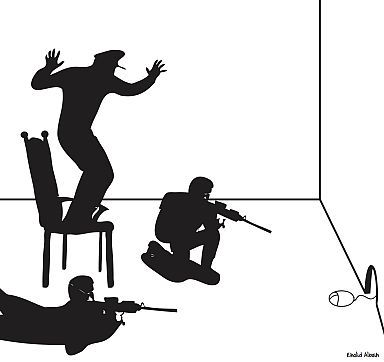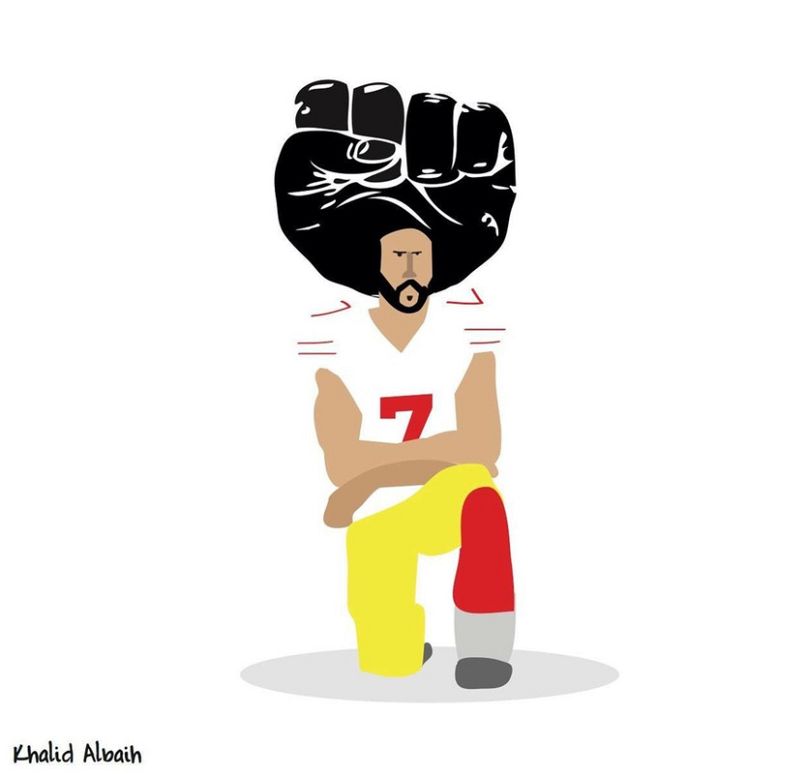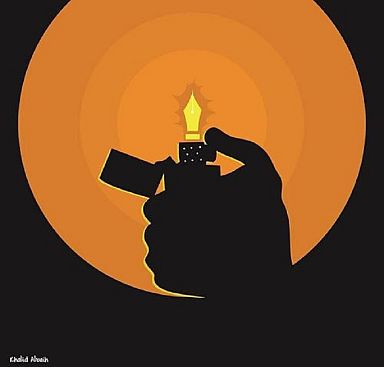Khalid Albaih is a Sudanese political cartoonist and civil rights activist. He has earned international recognition as one of the most influential political cartoonists. His fight has no frontiers and his goal has never changed: using art to make the world a better place, as he told The Dialogue.
The Dialogue sits down with inspirational people from across the globe with links to the Middle East and North Africa. Guy Shone explores what drives these extraordinary individuals.
Khalid Albaih was just a child when he faced the consequences of oppression and injustice for the first time. His family fled Sudan after the 1989 military coup.
"People always find the solution. (...) You build a block, people will go around it." Khalid Albaih told The Dialogue with deep conviction.
It’s hard to define home when you’ve spent most of his life in exile. Yet, Khalid has found a way. He has made the Internet his home, at least on a professional level: "I'm there all the time, because of where my work is and this is where I've learned and talked about a lot of things”, he says.
Publishing his work online was like being given a front-row seat at the start of the Arab Spring revolution. In 2011, news of the uprisings was instantly spread worldwide by social media networks. Activists took Khalid's cartoons in this digital environment and made them theirs. "We're all fighting for one cause, which is injustice. So I really feel proud. And that's why I take these things personally, because I am part of it. We're all part of it”, he insists.
Khalid Albaih has earned international recognition as one of the most influential political cartoonists. His fight has no frontiers: "I think this is really about showing the connections between all these movements that I've worked with, whether it's the Arab Spring or the Black Lives Matter movement or the Rohingya”, he explains.
Khalid’s convictions are rooted in his family background. The son of a diplomat and an activist, he was brought up in a family where "We always whispered about politics", he confides. Then, one day, politics and his passion for comic books and drawing met head-on.
"These worlds collided for me", he recalls. "That really blew my mind because political cartoons was [sic] everything that I was asking about”, he continues. “So, it kind of like [sic] combined these two worlds for me. And I saw how artists and cartoonists work around issues."
This passion took on a new dimension when he discovered the work of Palestinian cartoonist Naji Al Ali: “His work totally changed my life because it wasn't just about jokes. It wasn't just about the quality of the art. It was about the idea”, recalls Khalid.
Political cartoons often call out oppression, hypocrisy, and unpopular opinions. It is a very powerful way of delivering messages. However, the messenger is inevitably exposed. Naji al Ali was assassinated for his work in 1987, in London.
Khalid knows he's a target because of the causes he stands for. "It's a very scary thing. But when you face it, the question that really comes to mind is, (...) is it worth it? I've got a family. I've got kids. I have to earn a living.”
But for Khalid, there is no other way. “You really have to believe in what you're doing, and you really have to believe in asking questions and pushing the boundaries”, he continued.
Social networks come with inherent flaws. Khalid describes them as “filter bubbles” fed by algorithms, “a vicious circle”. Initially seen as a solution to the obstacle posed by censorship. "Today the Internet has become the obstacle. I'm supposed to discuss different things. I'm supposed to discuss it in a different way”, he explains.
Khalid's solution is to find a way around the problem, like finding alternative ways to promote human rights through art. “Get Faada” is a non-profit-organisation that aims to facilitate contact between creators and individual supporters of art. He also works on various projects in his home country, Sudan, in which the Sudanese people are both prisoners and victims of a bloody and never ending struggle between rival factions of the military government.
“The Sudan Arts and Design Library” project started in 2017, reclaims Khalid. The Covid crisis, the military coup in 2021 and, since last spring, war have derailed the project multiple times. “This is how hard it is for us to start anything that has to do with arts and culture in Sudan. It takes us years”, he says with sorrow.
Although constantly battling his way through obstacles, giving up is not an option for Khalid Albaih. His cartoon images represent the struggles of the oppressed globally. So he continues to fight back relentlessly, with art at his heart, to make the world a better place.















